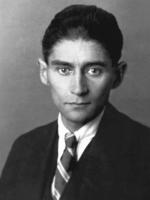The Arts & Humanities Research Council has awarded over one million pounds to a new project on Franz Kafka, led by Carolin Duttlinger alongside Barry Murnane (Oxford), Katrin Kohl (Oxford), and Lucia Ruprecht (Free University Berlin).
Describing the project, titled Kafka's Transformative Communities, Carolin said: 'Since his untimely death, Franz Kafka (1883-1924) has become a global phenomenon. Over the past century, every generation has discovered 'its' Kafka. Across seismic shifts his texts have spoken to readers from all walks of life, as reflected during the Covid pandemic, when memes about Gregor Samsa trapped in his bedroom went viral.
Both Kafka and his protagonists are often cast as isolated entities existentially disconnected from their surroundings. Kafka's Transformative Communities challenges this image by foregrounding a central but neglected aspect of his work: community. Our project uses Kafka's engagement with community as the springboard for a distinctive engagement with his texts, contexts and legacy.'
Community is the first of the project's three themes, exploring how Kafka's literary depiction of groups and collectives is shaped by, and in turn responds to, the central role of community in his immediate Jewish and wider Austro-Hungarian context.
Worldliness, the second theme, focusses on Kafka's role as a world author, looking at his reception in different times and places, while relating this status back to his own writings - his engagement with the power dynamics of a globalising world, in an age of colonialism, war and empire.

The third theme, Transformation, assesses Kafka's posthumous legacy in different art forms and media and their respective audiences. Carolin comments, 'our project does not treat such creative responses as an afterthought but as forms of investigation and interpretation in their own right.'
Two conferences, Kafka Transformed (2024) and Kafka in the World: Life, Death and Afterlife (2025), will connect scholars from different disciplines around the world while taking stock of Kafka's legacy. Travel bursaries will encourage the participation particularly of freelance artists, Early Career Researchers and academics based in emerging economies.
The project also includes the launch of a new Global Kafka Network, and a Digital Kafka Resource will connect people working on Kafka around the world, facilitating collaboration across disciplines, media and institutions.
A major Kafka exhibition will be also held at the Weston Library, which is home to Kafka's original manuscripts. In addition, the project will fund creative partnerships with leading artists and cultural institutions.
Carolin said, 'Our ambitious public engagement programme puts the experience of general readers, and of different groups and communities, centre stage.' The project's range of programmes will introduce a new generation of readers to Kafka.
For more information, see the Oxford Kafka Research Centre website, and follow @CaroDuttlinger and @MurnaneBarry on Twitter for more updates.